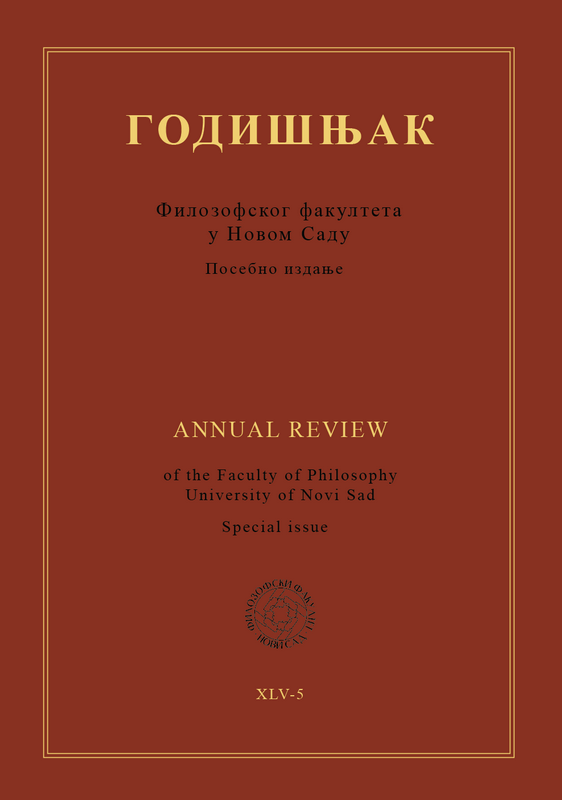A CORPUS-BASED CONTRASTIVE STUDY OF EXPERIENCER VERBS IN ENGLISH AND SERBIAN: SOME IMPLICATIONS FOR THE STRUCTURE OF VP
Main Article Content
Abstract
The aim of this paper is twofold. First, it reports on a parallel corpus study of experiencer verbs in English and Serbian and offers a contrastive description of this class of verbs. This investigation reveals two important observations: (i) a number of Serbian equivalents of English verbs with PP complements require oblique case-marked bare NP complements, (ii) the association between P-heads of these PP complements in English and their Serbian equivalents is not random (i.e. certain Ps in English correlate with certain Ps and/or oblique cases in Serbian). Understanding the potential theoretical significance of these observations is the second goal of the paper. The non-random link between English Ps and their Serbian counterparts speaks in favor of them having a semantic contribution, which goes against Neeleman’s (1997) analysis of Ps in PP complements as having no semantic contribution due to the fact that they LF incorporate into the verb. Neeleman’s (1997) account also fails to generalize to Serbian because oblique-cased bare NP complements exhibit syntactic characteristics of arguments. It is argued that the link between oblique-cased bare NP and PP complements speaks in favor of the functional/semantic equivalence along the lines of Caha (2009, 2013).
Downloads
Metrics
No metrics found.
Article Details
References
Alexiadou, A.-Iordăchioaia, G. (2014). The psych causative alternation. Lingua, 148, 53-79.
Alexiadou, A. (2016). English psych verbs and the causative alternation: A case study in the history of English. Questions and Answers in Linguistics, 3(2), 1-13.
Alexiadou, A. (2018). -Able adjectives and the syntax of psych verbs. Glossa: a journal of general linguistics, 3(1).
Arsenijević, N. (2015). Glagoli strahovanja i njihove dopune. In: Grković Major, J. -Ružić, V. (eds.) (2015). Lingvističke sveske 10, Srpski jezik i njegova norma, Novi Sad: Filozofski fakultet, 176-192.
Arsenijević, N. (2006). O glagolima voleti i zaljubiti se. In: Piper, P. (ed.) (2006). Zbornik radova Kognitivnolingvistička proučavanja srpskog jezika. Beograd: SANU. 71-85.
Baker, M. C. (1988). Incorporation: A theory of grammatical function changing. Chicago: University of Chicago Press.
Belletti, A.-Rizzi, L. (1988). Psych-verbs and θ-theory. Natural Language & Linguistic Theory, 6(3), 291-352.
Birtić, M.-Brač, I. & Runajić, S. (2017). The main features of the e-Glava online valency dictionary. In: Kosem, I.-Tiberius, C.-Jakubíček, J.-Kallas, M. J.- Krek, S. & Baisa V. (eds.) (2017). Electronic Lexicography in 21st Century. Proceedings of eLex 2017 Conference. Leiden: The Dutch Language Institute. 43-62.
Brač, I.-Oraić Rabušić, I. (2016). Određenje instrumentalne imenske skupine kao dopune u psiholoških glagola. Jezikoslovlje, 17(1-2.), 247-265.
Bošković, Ž. (2014). Now I’ma phase, now I’m not a phase: On the variability of phases with extraction and ellipsis. Linguistic inquiry, 45(1), 27-89.
Bošković, Ž. (2018). On movement out of moved elements, labels, and phases. Linguistic Inquiry, 49(2), 247-282.
Caha, P. (2009). The nanosyntax of case. (Doctoral dissertation). University of Tromso.
Caha, P. (2013). The jungle of the Czech local cases: Where semantics and morphology meet. In: Caha, P.-Schürcks, L.-Giannakidou, A. & Etxeberria, U. (eds.) (2013). The nominal structure in Slavic and beyond. Berlin: Walter de Gruyter. 209-237.
Cheung, C. C. H.-Larson, R. K. (2015). Psych verbs in English and Mandarin. Natural Language & Linguistic Theory, 33(1), 127-189.
Daković, S. (2016). Izražavanje psihičkih stanja u hrvatskom i poljskom jeziku – strukture s dativnim argumentom. Fluminensia , 27(2), 161-173.
Dowty, D. (1991). Thematic proto-roles and argument selection. Language, 67(3), 547-619.
Fábregas, A.-Marín, R. (2015). Deriving individual-level and stage-level psych verbs in Spanish. The Linguistic Review, 32(2), 227-275.
Grohmann, K. K. (2003). Prolific domains: On the anti-locality of movement dependencies. Amsterda: John Benjamins Publishing.
Hartshorne, J. K.-O’Donnell, T. J.-Sudo, Y.-Uruwashi, M.-Lee, M. & Snedeker, J. (2016). Psych verbs, the linking problem, and the acquisition of language. Cognition, 157, 268-288.
Kovačević, P. (2014). A (Very) Minimal Syntax: On the Relationship of DP, Scrambling and Case. (MA Thesis). University of Novi Sad.
Larson, R. K. (1985). Bare-NP adverbs. Linguistic inquiry, 16(4), 595-621.
Levin, B. (1994). English verb classes and alternations: A preliminary investigation. Chicago: University of Chicago press.
Milenković, A. (2017). Semantička i tvorbena analiza glagola kojima se označavaju osećanja u savremenom srpskom jeziku. (Doctoral dissertation). Univerzitet u Beogradu.
Milićev, T. -Bešlin, M. (2019). Instrumental case: why it is absent from the clitic system in Serbian/Croatian. In: Lopičić, V.-Mišić-Ilić, B. (eds.) (2019). Language, Literature, Theory. Niš: Faculty of Philosophy. 153-169.
Marelj, M. (2004). Middles and argument structure across languages. (Doctoral dissertation). Netherlands Graduate School of Linguistics.
Neeleman, A. D. (1997). PP-complements. Natural Language & Linguistic Theory, 15(1), 89-137.
Oraić, I. (2008). Kako razvrstati glagole s elementom se u valencijskome rječniku hrvatskih glagola?. Rasprave Instituta za hrvatski jezik i jezikoslovlje, 34, 269-283.
Oraić Rabušić, I. (2016). Rečenice kao dopune uz psihološke glagole u hrvatskom jeziku. Fluminensia, 28(2), 71-86.
Pesetsky, D. M. (1994). Zero syntax: Experiencers and cascades. Boston: MIT press.
Samardžić, T. (2006). Reč se u argumentskoj strukturi ditranzitivnih glagola. Naučni sastanak slavista u Vukove dane, 35(1), 179-193.
Šaravanja, L. (2011). Argumentna struktura psiholoških glagola u hrvatskom jeziku. Suvremena lingvistika, 37(72), 241-258.
Štrbac, G. (2006). O valentnosti glagola emocionalnog sadržaja u srpskom jeziku. Zbornik Matice srpske za filologiju i lingvistiku, 49(2), 73-103.




